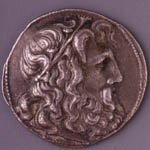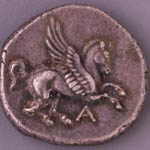  |
Hesiod, Theogony 270 - 305
Poseidon laying with Medusa in a field
View the Perseus Text
| 270 | And again, Ceto bore to Phorcys the fair-cheeked Graiae, sisters grey from their birth: and both deathless gods and men who walk on earth call them Graiae, Pemphredo well-clad, and saffron-robed Enyo, and the Gorgons who dwell beyond glorious Ocean |
| 275 |
in the frontier land
towards Night where are the clear-voiced Hesperides, Sthenno, and
Euryale, and Medusa who suffered a woeful fate: she was mortal, but the
two were undying and grew not old. With her lay the Dark-haired One
[Poseidon] in a soft meadow amid spring flowers.


|
| 280 | And when Perseus cut off her head, there sprang forth great Chrysaor and the horse Pegasus who is so called because he was born near the springs of Ocean; and that other, because he held a golden blade in his hands. Now Pegasus flew away and left the earth, the mother of flocks, |
| 285 | and came to the deathless gods: and he dwells in the house of Zeus and brings to wise Zeus the thunder and lightning. But Chrysaor was joined in love to Callirrhoe, the daughter of glorious Ocean, and begot three-headed Geryones. Him mighty Heracles slew |
| 290 | in sea-girt Erythea by his shambling oxen on that day when he drove the wide-browed oxen to holy Tiryns, and had crossed the ford of Ocean and killed Orthus and Eurytion the herdsman in the dim stead out beyond glorious Ocean. |
| 300 | And in a hollow cave she bore another monster, irresistible, in no wise like either to mortal men or to the undying gods, even the goddess fierce Echidna who is half a nymph with glancing eyes and fair cheeks, and half again a huge snake, great and awful, with speckled skin, eating raw flesh beneath the secret parts of the holy earth. And there she has a cave deep down under a hollow rock far from the deathless gods and mortal men. There, then, did the gods appoint her a glorious house to dwell in: and she keeps guard in Arima beneath the earth, grim Echidna, |
| 305 | a nymph who dies not nor grows old all her days. |